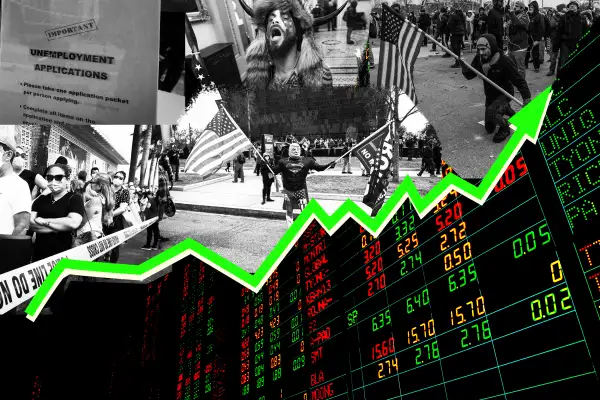Why Doesn't the Stock Market Care About All the Bad News?
Money is not a client of any investment adviser featured on this page. The information provided on this page is for educational purposes only and is not intended as investment advice. Money does not offer advisory services.

There are many ways to describe the past year — chaotic, devastating and scary all come to mind. But from the pandemic to increased racial tensions and widespread job loss, investors seemed mostly unfazed.
As people stayed isolated in their homes to avoid a deadly virus, stocks hit record highs. When protests broke out across the country in May after George Floyd was killed by police, the market kept going up. Then last week, a mob of Trump supporters violently stormed the Capitol and — once again — the market didn’t flinch, with the Dow closing at a record-high of 30,829 on Wednesday.
Yet, we often hear that the stock market hates uncertainty. So why is the market digesting all this bad news so well? And will it continue to do so in the future?
Do the markets really hate uncertainty?
There’s truth to the saying that the market hates uncertainty, but experts say it depends on what investors are uncertain about. They’re focused on events that will change policy or have a big economic impact on businesses. So while COVID-19 hitting the U.S. in March shook investors as businesses closed and a recession looked likely, events like last week’s violence at the Capitol — while it may have significant social and political consequences — aren’t likely to spell doom and gloom for Wall Street.
Plus, investors are forward looking.
“Main Street focuses on what is,” says Sam Stovall, chief investment strategist at CFRA Research, based in New York City. “Wall Street projects what will be.”
There was also the uncertainty we saw coming in 2020: the election. While Democrat Joe Biden pulled off a win for the presidency, it looked like the Republicans would retain control of the Senate — until they didn’t. Investors had seemed excited about the potential of a gridlocked government, but now they can at least celebrate that the Democrats are expected to spend more on stimulus. And since the Democratic majority in Congress is narrow, onerous new taxes likely won’t be introduced.
“You could say that the market is getting the best of both worlds,” Stovall adds. “Stimulus will be passed, but not on the backs of capitalists.”
Where will the stock market go from here?
A vaccine is in our future, but that doesn’t mean the economy is in the clear.
“We remain in an extremely fragile condition,” says Jon Burckett-St. Laurent, senior portfolio manager at Exencial Wealth Advisors in Huntersville, N.C. The Labor Department reported that the U.S. lost 140,000 jobs in December, reversing the recovery the jobs market had experienced since April. Meanwhile, COVID-19 continues to spread, with health experts warning of new variants. So the country remains heavily reliant on stimulus measures to keep the economy afloat until the vaccine is widely available and distributed, and any interruptions to the flood of government aid are likely one of the main risk factors at the moment, Burckett-St. Laurent adds.
But investors don’t see signs of the stock market slowing down, in part because the Federal Reserve has indicated it isn’t raising interest rates anytime soon. That encourages economic activity by keeping borrowing costs down for both individuals and businesses.
That means stocks — the S&P 500, specifically — are where investors should turn to get attractive returns, says Lamar Villere, portfolio manager with Villere & Co. in New Orleans. Right now, stocks are more attractive than bonds and everything else is more attractive than cash, he adds.
What should you do?
Since you can never say for sure what the stock market is going to do next, have a plan that makes sense long-term and stick to that plan through thick and thin. Consistently diversify across asset classes, and rebalance periodically.
As you near retirement, your plan should probably be adjusted to meet your changing goals and risk tolerance. With people living longer lives, you can’t assume that you don’t need any money in the stock market as you near retirement. But you also can’t put all your eggs into a risky basket, like Bitcoin, marijuana stocks or IPOs. A balanced approach, where you have some growth assets and some safer assets, is what makes the most sense, experts say.
“If I was talking to a client who had extreme fear of missing out, I would be counseling caution,” Burckett-St. Laurent says. “And if I spoke to a client who was 100% in cash, I’d be telling them about the risk of inflation.”
It’s about having a strategy that makes sense for you, avoiding knee-jerk investment decisions and staying calm, even when the world seems anything but.
More from Money:
Bitcoin Just Hit a Record High. Here's the Right Way to Invest in It
